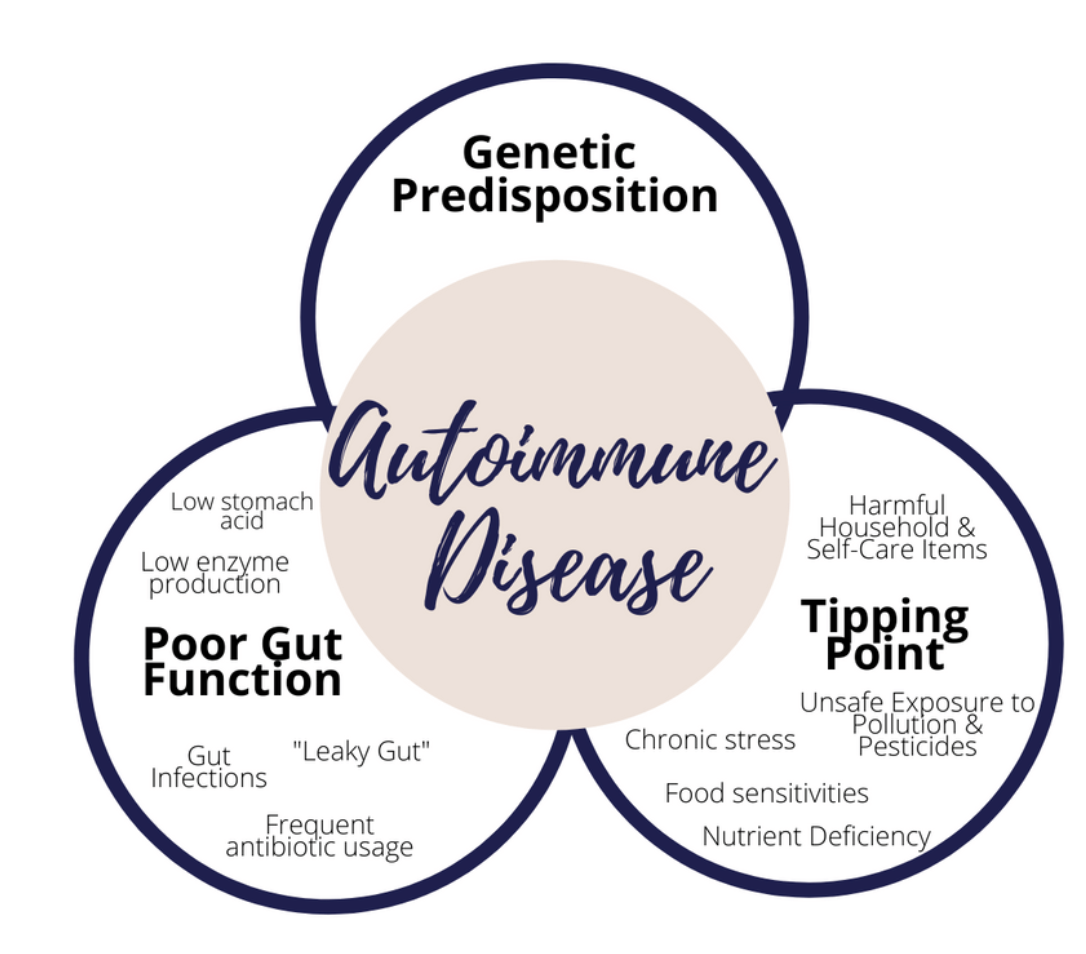| Last Thyroid School, I reviewed how to tell the difference between whether your hypothyroidism is autoimmune in nature or not. To review, autoimmunity is a problem when your immune system mistakenly attacks your body. The immune system normally guards against germs, bacteria, viruses, and other potential threats. When it senses these foreign invaders, it sends out an army of fighter cells to attack them. With autoimmunity, for a variety of reasons, the immune system attacks innocent bystanders including organs, tissues, foods, etc. In the case of Hashimoto’s, the immune system is attacking your thyroid. Simply put: autoimmune = confused immune system. Why should you care? Because MOST cases of hypothyroidism are due to autoimmunity— in fact, some studies estimate that nearly 90% of cases are due to autoimmune activity. Another reason you should care? Your immune system is ADAPTIVE and can either worsen or improve based on your diet, lifestyle, stressors, etc. While autoimmunity can be rooted in genetic predisposition, that only accounts for part of the picture. Consider having a genetic tendency like having a fully-loaded water gun. Whether or not that trigger gets pulled is heavily dictated by lifestyle factors (diet, stress, nutrient levels, gut health, etc.). We can’t change our genetics, but we can influence how our genes express themselves— this is called epi-genetics.  If you identified the presence of antibodies in your labs and/or if you’ve been diagnosed with Hashimoto’s, what are the first few things you can do: Check your Vitamin D. Vitamin D is a very important immune system modulator. Low levels alone are a significant predisposing factor to developing autoimmune disease. Additionally, Vitamin D requirements are higher in those with autoimmune disease. Emphasize food quality. Don’t worry so much about counting calories if you know that the quality food choices are less than ideal. Regulating the immune system and controlling inflammation is very nutrient demanding! Not sure where to start? Focus on these few things:1. Ingredient labels: look for recognizable food items that you can find in a kitchen2. Eating all the colors: the more colorful your plates, the better! I’m talking REAL, natural colors– no food dyes! 🙂 Colors represent antioxidants, vitamins, and minerals that are in high demand in the body! Allow for down-time. Stress is one of the most under appreciated, yet most influential aspects of health. Stress alone has the capability to trigger autoimmune onset. In fact, studies show that 80% of those diagnosed with autoimmunity report a stressful event preceding that! Give yourself permission to have decompression time! Having access to better quality food may not always be realistic due to availability and finances, so don’t feel defeated if you’re unable to always purchase organic, grass-fed, etc. Spend your dollars wisely where quality really matters. In my opinion, that means opting for: Meats: grass-fed, pasture-raised Eggs: pasture-raised, organic Dairy: organic, grass-fed Produce: if you’re eating the entire plant, opt for organic (for example, berries, spinach, etc.); if you’re peeling it, don’t stress if it’s not organic!If choosing the best quality isn’t realistic, just getting more real, whole-foods is a big step that will reap a LOT of reward. Are you feeling overwhelmed with where to start on your thyroid journey? I get it. This is exactly why I left my clinical Dietitian job at the hospital to start my private practice and advocate for my fellow Thyroid warriors! The nutritional therapy that I do in 1:1 work with clients and virtual course involves addressing the five fundamentals of nutritional health: Blood Sugar Balance Regulating Inflammation Adrenal Resiliency Intestinal Support Nutrient Repletion My BRAIN Method is a comprehensive approach to health that ensures you’re well taken care of from the inside out. Not only do I teach you the theory of each of these, but I incorporate specialty lab tests to personalize your approach. This includes testing like micronutrient testing, food sensitivity testing, stool analysis, cortisol testing, and even blood sugar/insulin evaluation. Missed out on past Thyroid School emails? Catch up here: Issue 1// Meet the Thyroid Issue 2// Thyroid Hormone Production Issue 3// Root Causes of Hypothyroidism, Part 1 Issue 4// Root Causes Of Hypothyroid, Part 2: Nutrient Deficiency Issue 5// Root Causes of Hypothyroid, Part.2, Nutrient Deficiency, Continued. Issue 6// Root Causes, Stress Issue 7// Autoimmune VS. Not Autoimmune Disclaimer: Please note that “Thyroid School” emails from Chews Food Wisely, LLC (and Nicole Fennell, RD) are not intended to create any physician-patient relationship or supplant any in-person medical consultation or examination. Always seek the advice of a trained health professional with any questions you may have regarding a medical condition and before seeking any treatment. Proper medical attention should always be sought for specific ailments. Never disregard professional medical advice or delay in seeking medical treatment due to information obtained in “Thyroid School” emails. Any information received from these emails is not intended to diagnose, treat, or cure. These emails, websites, and social media accounts are for information purposes only. The information in these emails, websites, and social media accounts are not intended to replace proper medical care. |

EMAIL:
hello@chewsfoodwisely.com
VIRTUAL APPOINTMENTS ONLY
Business Mailing Address:
2525 Robinhood Street
Houston, Texas 77005
© 2025 Chews Food Wisely. All Rights Reserved. Website Designed by AVM
Disclaimers | Privacy Policy | Terms of Purchase | Terms and Conditions